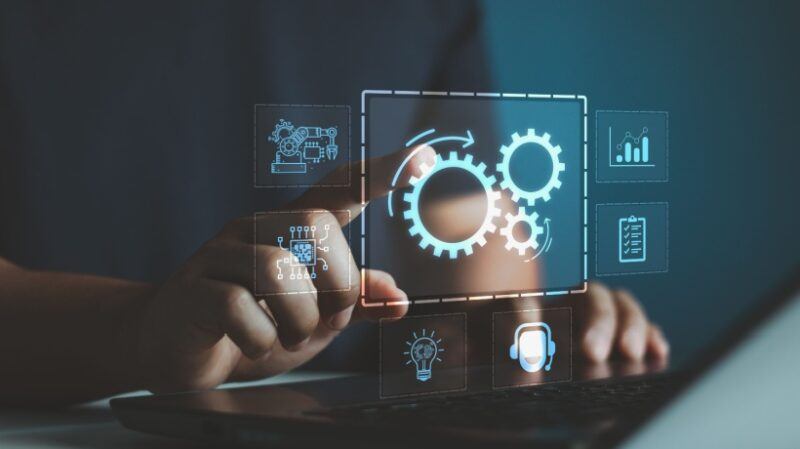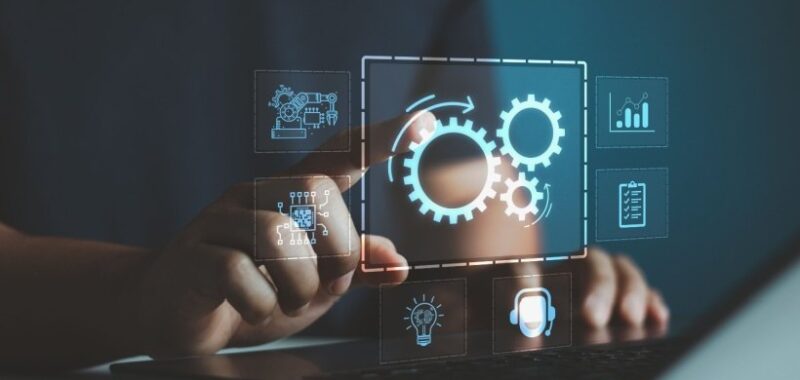
The Shift Towards Automation In Routine Tasks
Artificial Intelligence (AI) is automating repetitive and mundane tasks across industries. Automation reduces errors, increases efficiency, and enables workers to focus on creative and strategic roles. This shift in the workplace caused by AI and its effects on the future of work is most evident in manufacturing, data processing, and customer service.
AI And The Future Of Work
Manufacturing Sector Transformation
Automated assembly lines and AI-driven quality control systems dominate manufacturing. Robots handle repetitive tasks like welding and packing, which boosts productivity. However, this reduces the demand for manual labor in factories. Workers are moving towards roles that oversee or maintain these automated systems.
Customer Service Redefined
Chatbots powered by AI are now managing routine customer inquiries. This trend reduces the workload for human agents and enables them to focus on complex customer issues. While automation can displace some jobs, it also creates opportunities for those skilled in AI support system maintenance and programming.
Challenges And Opportunities
As AI takes over routine tasks, workers must adapt to stay relevant. Upskilling and reskilling programs become vital, offering training in areas such as AI oversight, ethical programming, and creative problem-solving.
The Rise Of Hybrid Work Models
Hybrid work, a combination of remote and in-office work, is becoming more prevalent. AI tools have played a critical role in enabling this shift by facilitating communication, collaboration, and productivity.
AI-Powered Collaboration Tools
Platforms like AI-driven project management systems and virtual assistants are helping teams work efficiently. These tools analyze workloads, set priorities, and even schedule meetings based on availability.
Remote Monitoring Systems
Employers use AI to monitor employee performance and productivity remotely. While some workers welcome the transparency, others express concerns about privacy. Finding a balance between oversight and autonomy is crucial for hybrid work success.
Future Implications
The hybrid model allows for greater flexibility, which boosts job satisfaction and retention. However, workers need to develop digital literacy to navigate AI-powered tools effectively.
Emerging Job Roles In AI-Driven Industries
While AI is automating some jobs, it is also creating new roles. These emerging roles require technical expertise, creativity, and adaptability.
AI Specialists
Engineers, data scientists, and Machine Learning experts are in high demand. They design, train, and deploy AI systems, ensuring they operate effectively and ethically.
Ethical Advisors
With AI’s growing influence, ethical concerns are gaining attention. Ethical advisors ensure AI systems comply with societal values, privacy norms, and legal requirements.
Creative Roles In AI-Enhanced Fields
AI is revolutionizing creative industries like marketing and design. Professionals skilled in using AI tools for creating personalized content and designs are highly sought after.
Upskilling As A Necessity For Career Growth
To thrive in the AI-driven job market, workers must invest in continuous learning. Upskilling programs are crucial for career advancement and job security.
Learning Technical Skills
Courses in coding, AI programming, and data analysis are widely available. These skills are essential for roles in AI management and development.
Developing Soft Skills
Creativity, emotional intelligence, and critical thinking are equally important. AI cannot replicate these human qualities, making them valuable in the workplace.
Corporate Initiatives
Companies are partnering with educational institutions to provide tailored training programs. These initiatives help workers transition smoothly into AI-enhanced roles.
The Impact On Traditional Jobs
AI’s integration into the workplace is affecting traditional roles, from administrative positions to healthcare. While some jobs face displacement, others are evolving.
Administrative Roles
Tasks like scheduling and data entry are increasingly handled by AI. Workers in these fields are pivoting towards roles requiring strategic thinking or client interaction.
Healthcare Advancements
AI-powered diagnostics and robotic surgeries are improving patient outcomes. Nurses and doctors are adopting new technologies to provide better care, requiring ongoing training and adaptability.
The Gig Economy And AI Integration
The gig economy, characterized by short-term contracts and freelance work, is also evolving due to AI. Platforms like ride-sharing apps and freelance marketplaces rely heavily on AI for efficiency.
Enhanced Matching Algorithms
AI improves the matching of workers to clients or tasks. This reduces wait times and increases job satisfaction.
New Opportunities In The Gig Space
Freelancers skilled in AI-based tools, such as graphic design software or data analysis programs, are thriving. AI’s role in the gig economy highlights the need for workers to embrace technology.
Ethical Challenges And The Human Element
AI’s influence on employment raises ethical questions about fairness, transparency, and inclusivity. Addressing these challenges is vital for a sustainable future of work.
Bias In AI Systems
AI algorithms can perpetuate biases present in their training data. This affects hiring decisions, promotions, and workplace diversity. Ensuring fairness requires constant oversight and updates to AI models.
Maintaining Human Connections
As AI takes on administrative and operational roles, human connections in the workplace risk being overshadowed. Leaders must foster interpersonal relationships to maintain a cohesive work environment.
AI And The Future Of Small Businesses
Small businesses are leveraging AI to compete with larger companies. From marketing to operations, AI offers cost-effective solutions.
Personalized Marketing
AI tools analyze customer data to create targeted marketing campaigns. This helps small businesses reach their audience more effectively.
Operational Efficiency
Inventory management, financial forecasting, and customer service are enhanced by AI. These tools allow small businesses to operate with the efficiency of larger corporations.
Preparing For The Workforce Of Tomorrow
As we approach 2025, preparing for an AI-driven workforce is essential. Governments, businesses, and individuals must collaborate to ensure a smooth transition.
Policy Reforms
Governments should focus on policies that support reskilling programs, protect workers’ rights, and promote ethical AI use.
Lifelong Learning
Workers must embrace a mindset of continuous learning to adapt to evolving job requirements.
Corporate Responsibility
Companies play a key role in preparing their workforce. Transparent communication and investment in training programs are essential steps.
Conclusion: AI And The Future Of Work
The integration of AI into the workplace is transforming how we work, live, and adapt. While it brings automation, efficiency, and innovation, it also poses challenges like job displacement and ethical concerns. However, the emergence of new roles, hybrid work models, and advancements in upskilling highlight the immense potential of AI to create a dynamic and inclusive workforce.
As businesses and individuals prepare for the future, embracing continuous learning, fostering ethical AI practices, and maintaining human connections remain critical. With the right balance of technology and human ingenuity, we can ensure that AI becomes a tool for growth, fairness, and opportunity in the evolving world of work.

